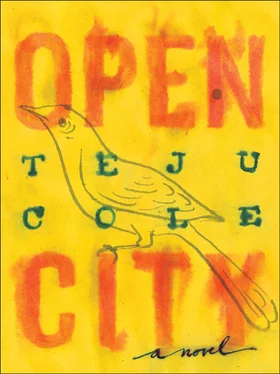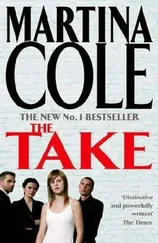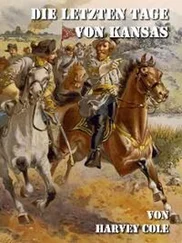Khalil, round-faced and talkative, interrogated me in French. He asked about where I was from; I responded in English. He wanted to know what I was doing in Brussels; I gave him a version of the truth about that. This man just got married, Farouq said. I congratulated him, and asked Farouq if he was married. They both laughed, and he shook his head and said, Not yet. Khalil said something to me that sounded like: America is a great country that is not a great country. I asked him to speak a bit more slowly, because my French was only a little bit better than his English. Does America really have a left? he said. Khalil is a Marxist, you see, Farouq said, in a gently mocking tone. Yes, I said, America has a left, an active one. Khalil looked genuinely surprised. The left there, he said, must be further to the right than the right here. Farouq had to translate this for me, because Khalil had spoken too quickly for me to catch. Not exactly, I said, the issues are emphasized differently. There are the Democrats, who share the political power, but there is also a genuine left, who would probably agree with you on many things. What are the important issues there? Khalil asked. What do left and right disagree on? As I began to answer him, as I enumerated the divisive issues, I felt faintly embarrassed at how tawdry they were: abortion, homosexuality, gun control — Khalil looked confused by that last term, and Farouq said des armes . Immigration’s also an issue, I said, though not in the same way as in Europe. Well, Khalil said, what about Palestine? I think your Democrats and Republicans are united on that issue.
The waitress, whose name was Paulina, finally brought my beer, and we raised our glasses. The beer went down easily, and I felt myself set into a new, pleasant keel by it. I said, it’s not so simple. There’s a strong leftist support for Palestinian causes in the United States. Many of my friends in New York, for example, think that Israel is doing terrible things in the Occupied Territories. But in practical terms, in terms of our government, well, the support for Israel is pretty solid in both parties. I think it has to do with religion, because the Christians walk in step with Jewish ideas about Jerusalem to a large extent, but it also has to do with the strong Israel lobby. At least that’s what the left-leaning magazines and journals say. And then there’s also the perception that we share elements of our culture and government with Israel.
This is the strange thing, Farouq said. They say that Israel is democratic, but it’s actually a religious state. It functions on a religious idea. He translated this into French for Khalil, who nodded in agreement. They were both chain-smoking. Pack a day? I said. For me, two packs, Khalil said. But wait, this interests me, he added, this obsession with communitarianism in the United States. I asked Farouq what the word meant, whether it was something like identity politics, but he said no, it wasn’t that, exactly. Khalil started speaking about communitarianism, about how it gave unfair leverage to minority interests, about how it was logically flawed. White is a race, he said, black is a race, but Spanish is a language. Christianity is a religion, Islam is a religion, but Jewishness is an ethnicity. It makes no sense. Sunni is a religion, Shiite is a religion, Kurd is a tribe, you see? He continued in this vein for a few minutes, and I lost the thread of his argument, but I didn’t ask Farouq to translate. I drank my beer. Khalil was quite exercised by the subject. It was easier to nod once in a while and make a show of following him.
I was getting hungry, and when Paulina came around again I ordered a salad and some grilled ribs. Khalil seemed to have gotten the communitarianism thing off his chest. Let me ask you something, he said, with mischief in his eye. The American blacks — he used the English expression — are they really as they are shown on MTV: the rapping, the hip-hop dance, the women? Because that’s all we see here. Is it like this? Well, I said slowly and in English, let me respond this way: Many Americans assume that European Muslims are covered from head to toe if they are women, or that they wear a full beard if they are men, and that they are only interested in protesting perceived insults to Islam. The man on the street — do you understand this expression? — the ordinary American probably does not imagine that Muslims in Europe sit in cafés drinking beer, smoking Marlboros, and discussing political philosophy. In the same way, American blacks are like any other Americans; they are like any other people. They hold the same kinds of jobs, they live in normal houses, they send their children to school. Many of them are poor, that is true, for reasons of history, and many of them do like hip-hop and devote their lives to it, but it’s also true that some of them are engineers, university professors, lawyers, and generals. Even the last two secretaries of state have been black.
They are victims of the same portrayals as we are, Farouq said. Khalil agreed with him. The same portrayal, I said, but that’s how power is, the one who has the power controls the portrayal. They nodded. My food arrived, and I invited them to join me. They both picked at the fries without protestation, and they ordered more beer.
If we talk of portrayal, Khalil said, Saddam is the least of the dictators in the Middle East. The least. I turned to Farouq to make sure I understood what he was saying. It’s true, Farouq said, I also think Saddam was the most moderate. They killed him only because he defied the Americans. But in my opinion he should be admired because he stood up for the right of his country against imperialism. I don’t see it that way at all, I said. The man was a butcher, and you know that. He killed thousands. Farouq shook his head and said, How many thousands more have died under the Americans now? Saddam was convicted of killing only 148, Khalil said. The king of Morocco is worse, I can tell you this; Gaddafi in Libya, Mubarak in Egypt, you can go all the way across like that — he made a sweeping motion with his hands — the whole region is full of dictators, and not only dictators, but terrible ones. And they remain in power because they sell the national interests of their countries to the Americans. We hate the king in Morocco, some of us really hate him. This man, when the communists were ascendant in the seventies, he appealed to Islamism; but when the Islamists started gaining political strength, he catered to capitalist and secularist factions. Thousands of people died under his rule, and thousands disappeared. How is this different from Saddam? But one thing I can tell you: I support Hamas. I think they are doing the work of resistance.
And Hezbollah, I said, you support them, too? Yes, he said, Hezbollah, Hamas, same thing. It is resistance, simple. Every Israeli home has weapons. I looked at Farouq. He looked at me levelly and said, It’s the same for me. It is resistance. And what about Al-Qaeda? I said. Khalil said, True, it was a terrible day, the twin towers. Terrible. What they did was very bad. But I understand why they did it. This man is an extremist, I said, you hear me, Farouq? Your friend is an extremist. But I was pretending to an outrage greater than I actually felt. In the game, if it was a game, I was meant to be the outraged American, though what I felt was more sorrow and less anger. Anger, and the semiserious use of a word like extremist , was easier to handle than sorrow. This is how Americans think Arabs think, I said to them both. It really saddens me. And you, what about you, Farouq? Do you support Al-Qaeda, too?
He was quiet for a moment. He poured his beer, and drank, and for what seemed a few long seconds, we sat in silence. Then he said, Let me tell you a story from our tradition, a story about King Solomon. King Solomon gave a teaching once about the snake and the bee. The snake, King Solomon said, defends itself by killing. But the bee defends itself by dying. You know how a bee dies after a sting? Like that. It dies to defend. So, each creature has a method that is suitable to its strength. I don’t agree with what Al-Qaeda did, they use a method I would not use, so I cannot say the word support . But I don’t cast judgment on them. As I said before, Julius, and I think you should understand this: in my opinion, the Palestinian question is the central question of our time.
Читать дальше












